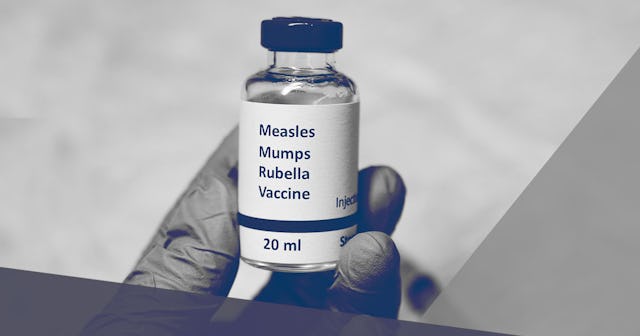Measles Is 10x More Contagious Than COVID-19––Good Thing There's A Vaccine

I did two things after the World Health Organization declared COVID-19 a global pandemic and schools and offices shut down. First, I panicked, and did all the things a single mom does when panicking and preparing for a global pandemic quarantine. And second, I called my daughter’s pediatrician’s office and rescheduled her well visit.
One of those things was easier to do than the other. I rescheduled my daughter’s appointment, believing (naively) that the pandemic would be over by late spring/early summer. The choice had been easy. My daughter wasn’t due for any vaccines nor did I have any pressing concerns that needed a pediatrician’s immediate attention. We could wait another few weeks.
As it turns out, many parents and caregivers made the same choice back in March. But many of those families have not yet returned for their well visits, causing pediatricians to worry about missed vaccines and the effect they may have on the community.
Scary Mommy spoke with Dr. Sara Bode, MD, medical director of Nationwide Children’s Care Connection School-Based Health and Mobile Clinics and lead author of a study that compared measles vaccination rates from before the pandemic to this summer. Dr. Bode and her team found a ten percent decline in the number of children who had received their first MMR vaccine.
At first glance, that number likely means little to you. What exactly does it mean for a community if ten percent of kids aren’t getting their measles vaccines, particularly when there’s a deadly virus infecting more than 200,000 people a day and killing more than 3,000 individuals a day floating around?
But the truth is that measles is deadly and a ten percent drop in vaccinations has a significant community impact. A ten percent drop in vaccinations means the community no longer has herd immunity, according to Dr. Bode, who noted that past and recent models have shown how quickly and easily measles outbreaks can occur in a community that doesn’t have herd immunity. “Within a few days, you can have one case turn into hundreds.”
Karl Tapales/Getty
“The minute you start to have any kind of breakdown or fraying of immunity, measles is always the one that comes back,” says Dr. Paul Offit, an immunology expert and director of the Vaccine Education Center at the Children’s Hospital of Philadelphia (CHOP), in an interview with CBS News.
That’s true because measles is a highly contagious virus. It is ten times more contagious than COVID and spreads easily. It can pass via respiratory droplets or contaminated surfaces. As a result, if you have a setting—such as a school or daycare—with a large number of unprotected children, you can see an outbreak fairly quickly. “Measles is a virus that requires only a small amount of measles to pass from one person to the next,” says Dr. Bode.
The good thing is that if you did delay your child’s well visit and/or vaccination due to fear of COVID exposure, it’s not too late to catch up. Dr. Bode assures us that even if your child is behind with his or her vaccinations, it’s never too late to catch up.
And doing so is important—even if you’re listening to health experts and staying home while this pandemic is raging around us. Because COVID will fade, and the world will open up again (hopefully sooner, rather than later), and it’ll only take one exposure before a community is dealing with another deadly virus outbreak. This time one that could have been completely preventable.
Urging families to get their children vaccinated is easy, but without addressing the concerns that kept them from going to those appointments in the first place, all the urging in the world will be pointless.
Families canceled or delayed their well visit appointments for children for a number of reasons. Many, like mine, delayed due to fear of COVID exposure—the last place they wanted to be was the place to which sick people flocked. Other families canceled and haven’t rescheduled due to stressors the pandemic added, including job loss, income loss or housing instability—all of which made going to a check-up difficult to prioritize, says Dr. Bode.
Dr. Bode and pediatricians and clinics around the country have taken steps to address those concerns. Both the CDC and the American Pediatric Academy published guidelines for pediatric offices to ensure safety. The measures including masking, separating sick and well patients, and PPE for doctors. Dr. Bode would encourage any parent who is nervous to call their pediatrician and ask about protocols, which may help alleviate concerns.
For those families who are uncomfortable going into an office or who are unable to navigate check-ups, perhaps because they do not have access to reliable transportation or other reasons, many clinics have “worked hard to take vaccines to where the families are,” says Dr. Bode. Her team has set up vaccine clinics at school sites, homeless shelters, apartment complexes, and other community sites. These same types of vaccine clinics are popping up across the nation and worth speaking to your pediatrician about.
When it comes to COVID, until the vaccines are widely available, we’re all stuck only with mitigating measures—masks and social distance. But when it comes to measles, we don’t have to settle for only mitigating. We can prevent it. “If you get one dose of measles vaccines, you’re protected. It’s such an easy thing to do to 100% protect your family,” says Dr. Bode.
I know nobody wants another virus to worry about. We all want to put COVID behind us and never hear the words “infectious deadly virus” ever again—or maybe that’s just me. But in order to ensure we do get a reprieve from those words, we have to make sure as a community we don’t lose herd immunity to a disease that is 100% preventable.
This article was originally published on